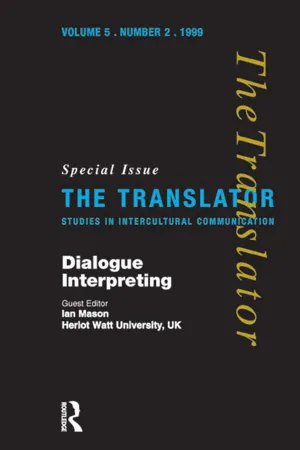
- 239 pages
- English
- ePUB (mobile friendly)
- Available on iOS & Android
Dialogue Interpreting
About this book
Dialogue interpreting includes what is variously referred to in English as Community, Public Service, Liaison, Ad Hoc or Bilateral Interpreting - the defining characteristic being interpreter-mediated communication in spontaneous face-to-face interaction. Included under this heading are all kinds of professional encounters: police, immigration and welfare services interviews, doctor-patient interviews, business negotiations, political interviews, lawyer-client and courtroom interpreting and so on. Whereas research into conference interpreting is now well established, the investigation of dialogue interpreting as a professional activity is still in its infancy, despite some highly promising publications in recent years. This special issue of The Translator, guest-edited by one of the leading scholars in translation studies, provides a forum for bringing together separate strands within this developing field and should create an impetus for further research.
Viewing the interpreter as a gatekeeper, coordinator and negotiator of meanings within a three-way interaction, the descriptive studies included in this volume focus on issues such as role-conflict, in-group loyalties, participation status, relevance and the negotiation of face, thus linking the observation of interpreting practice to pragmatic constraints such as power, distance and face-threat and to semiotic constraints such as genres and discourses as socio-textual practices of particular cultural communities.
Tools to learn more effectively

Saving Books

Keyword Search

Annotating Text

Listen to it instead
Information
1 | D | So what happened when V came on board the ship? |
2 | I | Itak, chto sluchilos’, kogda V prishel na korabl’? So, what happened when V came on the ship? |
3 | W | Sho, kto ego znaet, kogda on prishel. No, kogda ya uslykhal shum, |
3a | ya vstal i dver’ otkryl. What, who knows when he came. But, when I heard the noise, I got up and opened the door. | |
4 | I | I don’t know when he came. But, when I heard the noise, I got |
4a | up and opened my door. | |
5 | D | Did you see V? |
6 | I | Vy videli V? Did you see V? |
7 | W | Nu, da. On stoyal u kayuty A. Well, yes. He stood near the cabin of A. |
8 | I | Well, yes. He stood at the door of uhh A’s cabin. |
9 | D | What did he do then? |
10 | I | Chto on delal potom? What did he do then? |
11 | W | Sho on delal? On skazal A: “Ya tebya uroyu.” What did he do? He said to A: “I’ll dig you”. |
12 | I | He said to A: “I’ll kill you.” |
Table of contents
- Cover Page
- Title Page
- Copyright Page
- Contents
- Introduction
- The Hospital Cleaner as Healthcare Interpreter A Case Study
- The Tenor of Consultant Physicians Implications for Medical Interpreting
- Information Loss in Bilingual Medical Interviews through an Untrained Interpreter
- Signs of Injustice
- Telephone Interpreting & the Synchronization of Talk in Social Interaction
- “Nicole Slapped Michelle” Interpreters and Theories of Interpreting at the O. J. Simpson Trial
- Police Interpreting Politeness and Sociocultural Context
- The Interpreter on the (Talk) Show Interaction and Participation Frameworks
- Revisiting the Classics
- Course Profile
- Appendix A Screening Test (conducted in Spanish; presented here in English translation)
- Appendix B Syllabus for First Training Course
- Appendix C Sample Scenario for Role-Playing
- Dialouge Interpreting
Frequently asked questions
- Essential is ideal for learners and professionals who enjoy exploring a wide range of subjects. Access the Essential Library with 800,000+ trusted titles and best-sellers across business, personal growth, and the humanities. Includes unlimited reading time and Standard Read Aloud voice.
- Complete: Perfect for advanced learners and researchers needing full, unrestricted access. Unlock 1.4M+ books across hundreds of subjects, including academic and specialized titles. The Complete Plan also includes advanced features like Premium Read Aloud and Research Assistant.
Please note we cannot support devices running on iOS 13 and Android 7 or earlier. Learn more about using the app